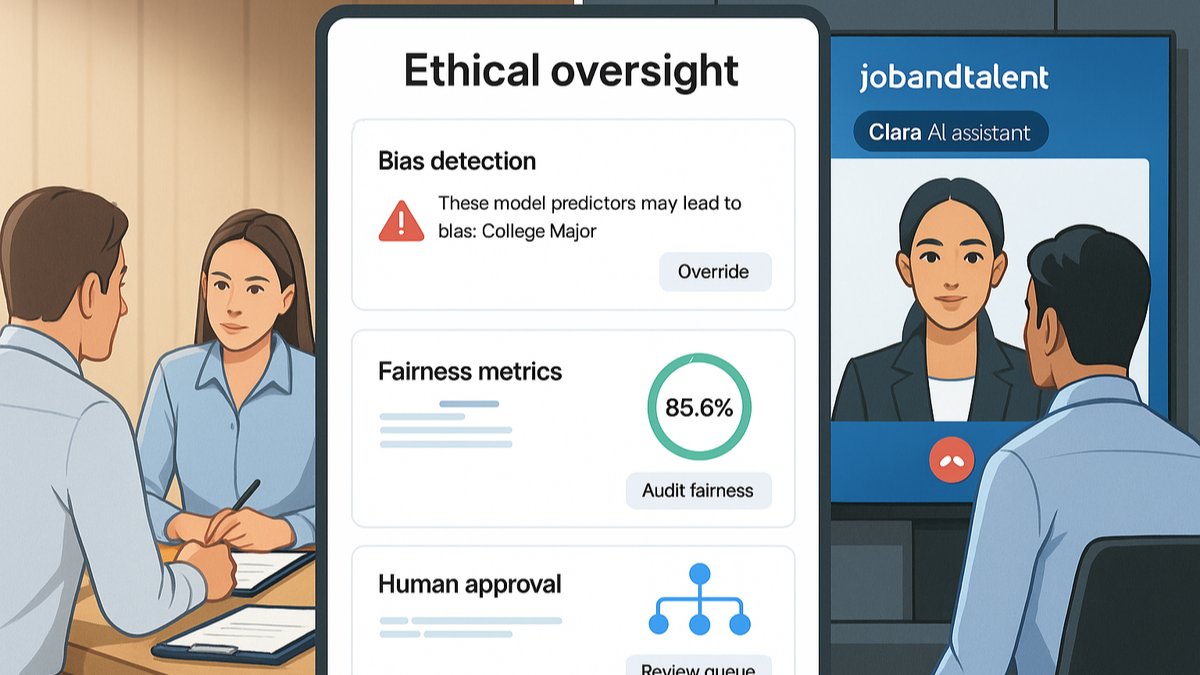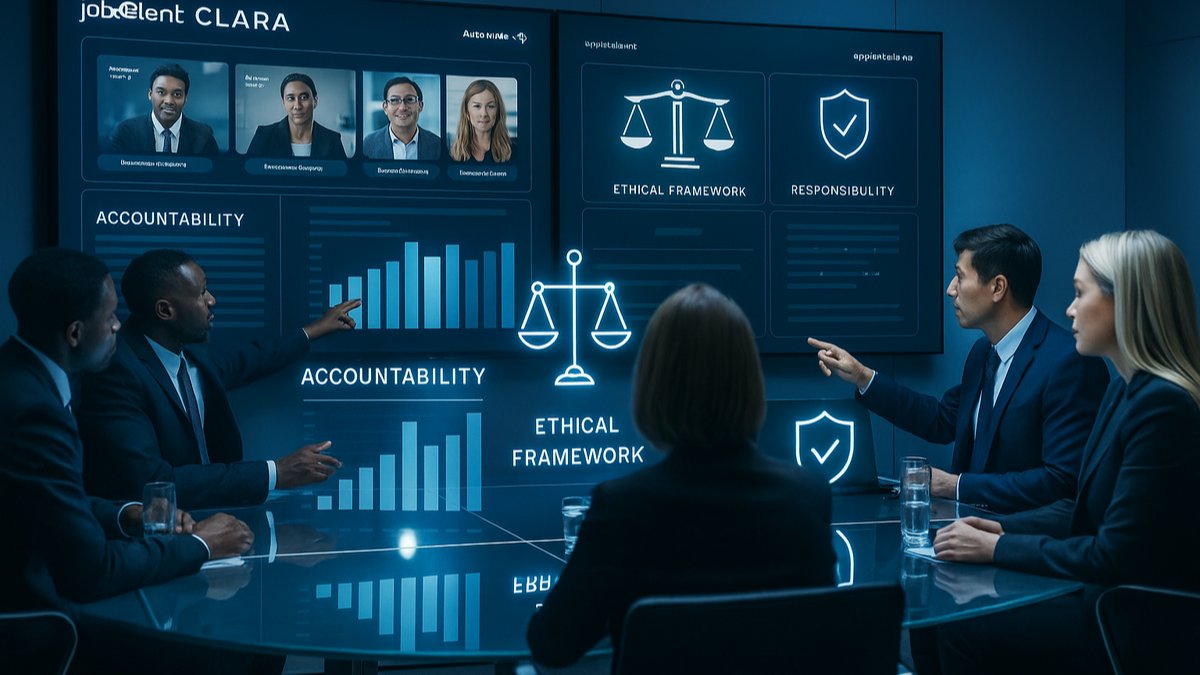Job and Talent AI Agents: The human resources profession stands at an unprecedented inflection point. While HR departments worldwide grapple with digital transformation strategies, Job and Talent AI Agents are already conducting over 190,000 interviews and facilitating 22,000+ successful employee placements globally. This revolutionary approach to workforce management isn’t just changing recruitment processes; it’s fundamentally redefining what professional responsibility means for HR practitioners in the AI era.
Job and Talent AI Agents: For HR professionals and training specialists, particularly those operating in the UAE’s dynamic business environment, understanding these developments isn’t just about staying current with technology trends. It’s about preparing for a future where AI agents become integral team members requiring the same level of professional oversight and ethical consideration as human employees.
Job and Talent AI Agents: The AI Transformation of HR Professional Practice
Job and Talent AI Agents: Job&Talent’s recent EUR 92 million Series F funding round signals institutional confidence in AI-powered workforce management, but the implications extend far beyond venture capital metrics. Their suite of AI agents—Clara (recruitment), Sara (attendance coaching), Teo (account management), and Maria (performance coaching) represents a comprehensive reimagining of core HR functions that every human resources professional must understand and prepare for.
Clara’s ability to conduct interviews 24/7 with 90% candidate satisfaction rates while operating 65% faster than traditional methods demonstrates that AI agents aren’t replacing HR professionals; they’re amplifying human capabilities while requiring new forms of professional responsibility and oversight. When Clara recently helped one employer reduce hiring timelines from 8 weeks to 3 weeks for thousands of workers, she didn’t eliminate the need for HR expertise; she elevated it to more strategic, relationship-focused activities.
Job and Talent AI Agents: This transformation demands that HR professionals develop new competencies around AI management, ethical oversight, and technology-human integration that weren’t part of traditional HR education or certification programmes.
Redefining HR Professional Responsibility
Job and Talent AI Agents: The integration of AI agents into HR processes creates unprecedented professional responsibility challenges that require entirely new frameworks for ethical practice. When an AI system makes decisions about hiring, performance coaching, or employee development, HR professionals must grapple with questions that previous generations of practitioners never faced.
Traditional HR professional responsibility centred on direct human interaction, personal judgement, and individual accountability for employment decisions. The AI era requires HR professionals to develop competencies around AI oversight, algorithmic bias prevention, and technology-human collaboration that maintain ethical standards while leveraging enhanced capabilities.
Job and Talent AI Agents: Research indicates growing concerns about “decision-making responsibility when outputs are co-created with AI rather than independently generated by humans.” For HR professionals, this challenge is amplified by the personal nature of employment relationships and the potential for AI decisions to significantly impact individual career trajectories and organisational culture.
Building AI-Ready HR Competencies

Job and Talent AI Agents: The most successful HR professionals will be those who can effectively manage hybrid human-AI teams while maintaining the highest standards of professional responsibility. This requires developing entirely new skill sets that combine traditional HR expertise with technology management capabilities. AI attendance coach.
AI Agent Management: HR professionals must learn to onboard, train, and performance-manage AI agents just as they would human team members. This includes setting clear objectives, monitoring performance metrics, and ensuring consistent alignment with organisational values and policies.
Ethical Oversight and Bias Prevention: AI systems require continuous monitoring to prevent discriminatory outcomes or biased decision-making. HR professionals must develop competencies around algorithmic auditing, bias detection, and corrective intervention protocols that protect both candidates and employees.
Technology-Human Integration: The most effective AI implementations enhance rather than replace human judgement. HR professionals must learn to design workflows that optimise the unique strengths of both AI agents and human team members while maintaining seamless candidate and employee experiences.
Data Privacy and Compliance: AI systems generate vast amounts of sensitive employment data that must be managed according to evolving privacy regulations and ethical standards. HR professionals need expertise in data governance, privacy protection, and regulatory compliance in AI contexts.
Professional Development for the AI Era
Job and Talent AI Agents: The rapid advancement of AI capabilities means that HR professional development must evolve beyond traditional training models. Job&Talent’s success demonstrates that AI agents can handle routine HR tasks with exceptional efficiency, freeing human professionals to focus on strategic, relationship-based, and culturally sensitive activities that require uniquely human capabilities.
This evolution requires HR professionals to develop comfort with continuous learning, technology adaptation, and role redefinition that may feel uncomfortable for practitioners accustomed to stable, well-defined professional boundaries. Candidate data proprietary AI expert.
Strategic Workforce Planning: As AI handles operational recruitment tasks, HR professionals must develop enhanced capabilities around long-term workforce strategy, organisational design, and talent pipeline development that integrate AI capabilities with business objectives.
Culture and Change Management: Implementing AI agents successfully requires sophisticated change management skills that help employees and managers adapt to new ways of working while maintaining organisational culture and values.
Advanced Analytics and Insights: AI systems generate unprecedented amounts of workforce data that can inform strategic decisions. HR professionals must develop analytical capabilities that translate AI-generated insights into actionable business strategies.
The UAE Context: Cultural Intelligence Meets AI
Job and Talent AI Agents: Operating in the UAE’s multicultural business environment adds additional complexity to AI-powered HR management. Professional responsibility in this context requires ensuring that AI agents can navigate cultural sensitivities, regulatory requirements, and diverse workforce expectations while maintaining fairness and compliance across different cultural groups.
When AI agents evaluate candidates from diverse cultural backgrounds for UAE-based positions, HR professionals must ensure that algorithms account for cultural communication styles, educational background variations, and workplace expectation differences without perpetuating stereotypes or discriminatory practices.
Job and Talent AI Agents: The UAE’s emphasis on Emiratisation adds another layer of professional responsibility, requiring HR professionals to ensure that AI systems support national talent development objectives while maintaining merit-based selection criteria and fostering inclusive workplace environments.
Ethical Frameworks for AI-Enhanced HR
Job and Talent AI Agents: Developing robust ethical frameworks for AI-enhanced HR practice requires moving beyond traditional compliance approaches to embrace proactive responsibility for AI system outcomes. This means establishing clear principles, regular auditing processes, and intervention protocols that ensure AI agents operate according to professional HR standards.
Transparency and Explainability: Candidates and employees must understand how AI systems make decisions that affect their careers. HR professionals must ensure that AI agents can provide clear explanations for their recommendations and that these explanations meet both legal requirements and ethical standards.
Human Override Capabilities: While AI agents can handle routine decisions efficiently, complex or sensitive situations must maintain clear escalation paths to human HR professionals who can apply contextual judgement and cultural sensitivity.
Continuous Monitoring and Improvement: AI systems require ongoing evaluation to ensure they continue meeting professional responsibility standards as they learn from new data and encounter new situations.
Preparing for the Future of HR
Job and Talent AI Agents: The transformation represented by Job and Talent AI Agents is just the beginning. As AI capabilities continue advancing, HR professionals who develop expertise in managing AI-human hybrid teams while maintaining the highest ethical standards will be best positioned to lead their organisations through this technological transition.
The future of HR isn’t about choosing between human expertise and AI efficiency; it’s about creating integrated approaches that leverage the best of both while maintaining professional responsibility standards that protect employees, candidates, and organisational integrity.
The most successful HR professionals will be those who embrace AI as a powerful tool for enhancing human potential while maintaining unwavering commitment to ethical practice, cultural sensitivity, and professional responsibility that puts people first in every decision.

